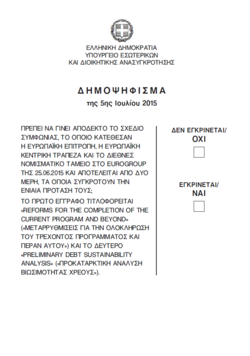| ||||||||||||||||||||||
Should the agreement plan submitted by the European Commission, the European Central Bank and the International Monetary Fund to the Eurogroup of 25 June 2015, and comprised of two parts which make up their joint proposal, be accepted? The first document is titled "Reforms For The Completion Of The Current Program And Beyond" and the second "Preliminary Debt Sustainability Analysis." | ||||||||||||||||||||||
| Outcome | Tsipras government agrees to the bailout agreement with European authorities despite the referendum results Finance minister Yanis Varoufakis resigns | |||||||||||||||||||||
|---|---|---|---|---|---|---|---|---|---|---|---|---|---|---|---|---|---|---|---|---|---|---|
| Results | ||||||||||||||||||||||
| ||||||||||||||||||||||
 | ||||||||||||||||||||||
| ||
|---|---|---|
First term Second term
First term
Second term
Elections | ||
A referendum to decide whether Greece should accept the bailout conditions in the country's government-debt crisis proposed jointly by the European Commission (EC), the International Monetary Fund (IMF) and the European Central Bank (ECB) on 25 June 2015 took place on 5 July 2015. [1] The referendum was announced by Prime Minister Alexis Tsipras in the early morning of 27 June 2015 and ratified the following day by the Parliament and the President. It was the first referendum to be held since the republic referendum of 1974 and the only one in modern Greek history not to concern the form of government.
Contents
- Background
- Referendum question
- Legality concerns
- Court ruling
- Reception
- European Commission
- Council of Europe
- United Nations independent experts
- Campaigns
- Positions on implications of the referendum
- Greek organisations
- Positions on the vote itself (Yes/No)
- Political parties
- Newspapers
- Opinion polls
- After the referendum announcement
- Before the referendum announcement
- Results
- By region
- Aftermath
- See also
- References
- External links
As a result of the referendum, the bailout conditions were rejected by a majority of over 61% to 39%, with the "No" vote winning in all of Greece's regions. The referendum results also forced the immediate resignation of New Democracy leader Antonis Samaras as party president because of the perceived negative result of the "Yes" choice, to which the conservative party and Samaras had committed themselves. [2] Although winning the referendum, Finance Minister Yanis Varoufakis also resigned and was replaced on 6 July by Euclid Tsakalotos.
Despite the result of the referendum, the government of Tsipras reached an agreement on 13 July 2015 with the European authorities for a three-year-bailout with even harsher austerity conditions than the ones already rejected by voters. This represented a "drastic turnaround" for Prime Minister Tsipras' position, [3] as he had been elected in an anti-austerity platform. Former Finance Minister Yanis Varoufakis characterised the harshness of the deal as a new Treaty of Versailles and "Greece's Terms of Surrender". [4] In July and August, Tsipras was able to get the new austerity packages and the entire bailout agreement approved by the Parliament, but had to rely on the pro-European Union opposition parties as around 40 MPs of the major ruling party abstained or voted against the measures. [5] [6] This triggered the September 2015 snap election, where Tsipras was re-elected, albeit with an historical low turnout. The second Tsipras government was marked by an intense austerity policy in the context of the third bailout to Greece.
Greece officially exited from the bailout programs in August 2018 (three years after the referendum) and the Tsipras government announced some social cohesion measures such as increases in pensions and aid packages for low-income groups. [7] The economy has also seen growth, albeit at a slow pace. [8] However, these developments have not diminished criticism levelled at the Syriza government for its U-turn and the huge economic and social cost of austerity policies it imposed.





